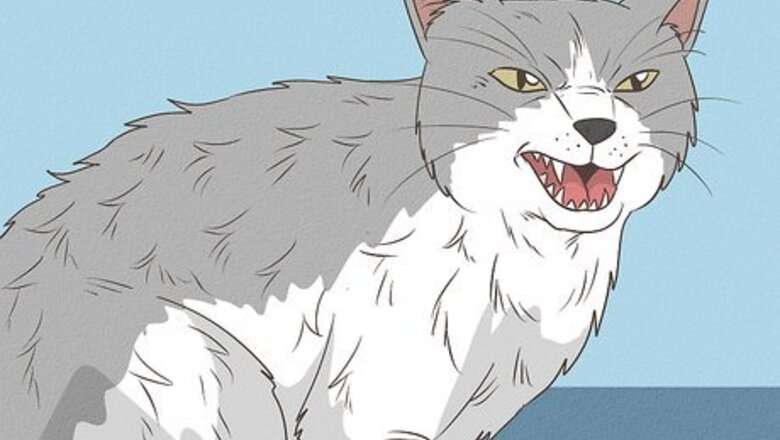
views
X
Research source
Although treatable, it can make your cat feel pretty miserable. If you have an older cat who becomes sick and isn’t acting like her usual self, she may have hyperthyroidism. Your veterinarian can diagnose and treat this disease.
Diagnosing Hyperthyroidism in Your Cat
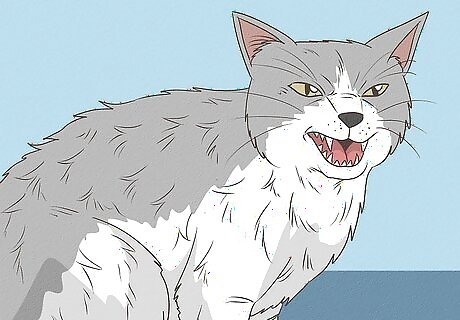
Watch your cat for signs of hyperthyroidism. Thyroid hormones affect many organs in your cat’s body. Therefore, elevated thyroid hormone levels can cause a wide range of clinical signs, the most common of which are weight loss and increased appetite. Other clinical signs include increased activity/restlessness, excessive thirst, and increased urination. Cats with hyperthyroidism can have also diarrhea, pant more, and shed more often. Your cat’s coat may look matted or greasy if she has hyperthyroidism. Your cat may also be unusually cranky or aggressive. Remember that hyperthyroidism’s clinical signs often resemble those of "older cat" diseases, like diabetes and chronic kidney disease. Your veterinarian will be able to be able to perform specific diagnostic tests to confirm hyperthyroidism.
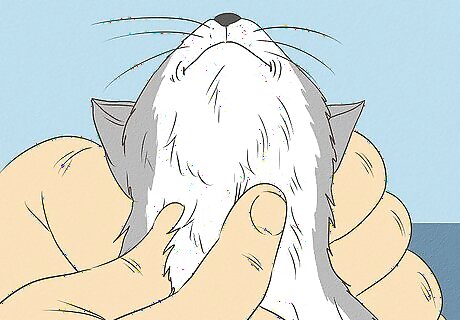
Touch your cat’s neck. If your cat has hyperthyroidism, you will likely be able to feel the enlarged thyroid glands. They are located underneath your cat’s neck, next to his trachea. One or both glands will be enlarged. Both glands are enlarged in about 70% of feline hyperthyroidism cases. Sometimes, the thyroid glands can become so enlarged that they "sink" into the chest. In this case, you would not be able to feel them.

Perform a physical examination. If you suspect your cat has hyperthyroidism, take her to your veterinarian, who will be able to confirm a hyperthyroidism diagnosis.Testing your cat’s thyroid hormones will likely confirm hyperthyroidism. However, since hyperthyroidism can affect many parts of your cat’s body, your veterinarian will also perform a thorough physical examination of your cat to assess her overall health. For example, if your veterinarian strongly suspects hyperthyroidism, he will take a close listen to your cat’s heart. Cats with hyperthyroidism often have a quick heart rate. Your veterinarian may want to run an ultrasound test to look at your cat’s heart. Hyperthyroidism in cats can cause the heart muscle to become thickened. In addition to the physical examination, your veterinarian will take blood and urine samples to rule out other diseases like diabetes and kidney failure.
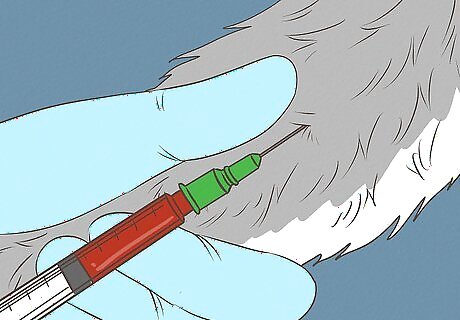
Measure your cat’s thyroid hormone levels. Your veterinarian will take a blood sample to test your cat’s thyroid hormone levels, namely T4. Most likely, your cat’s T4 levels will be high. T4 levels will be normal in 2 to 10% of cats with hyperthyroidism. These normal levels could be due normal hormone level fluctuations. Concurrent illness can also lower elevated T4 levels in hyperthyroid cats. If your veterinarian strongly suspects hyperthyroidism, she may want to check your cat’s thyroid hormone levels several times before confirming the diagnosis.
Deciding How to Treat Your Cat’s Hyperthyroidism
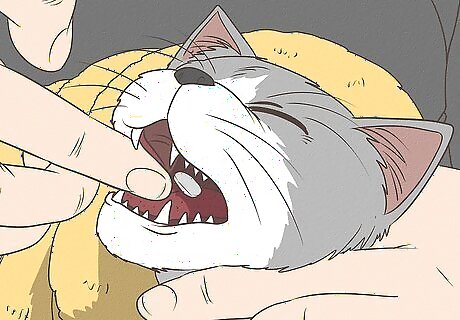
Identify the treatment options for hyperthyroidism. There are three ways to treat hyperthyroidism in cats: oral medication, surgical removal of the thyroid glands ("thyroidectomy"), and radioactive iodine therapy. Each of these treatment options has its advantages and disadvantages, so it is important to understand how each one works before deciding which one would be best for your cat. For example, oral medication is relatively inexpensive, but could be impractical if your cat doesn’t like getting pills.
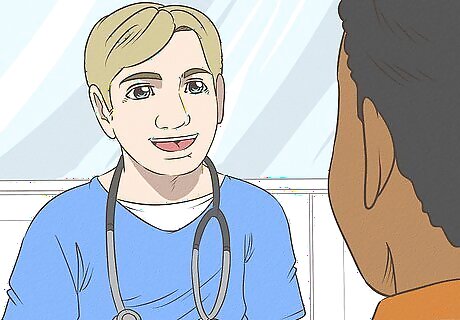
Discuss treatment options with your veterinarian. The best way to determine which treatment options will work best for your cat is to talk with your veterinarian. He will be able to explain each option in each detail and provide a professional opinion as to which one will be most effective for your cat. Oral therapy works by decreasing the production and release of thyroid hormones into the body. It is not curative, but can effectively control hyperthyroidism. Oral therapy is lifelong. A thyroidectomy is a straightforward procedure to remove the overactive tissue. It is curative in most cases, but won't stop the second thyroid from becoming overactive in the future. Although surgery can be expensive, it can actually end up costing less than lifelong oral therapy. Disadvantages of surgery include the risk of anesthesia in older cats and the rare possibility of damaging nearby healthy tissue, such as the parathyroid glands. Radioactive iodine therapy is quickly becoming the therapy of choice for feline hyperthyroidism. The iodine is injected through one of your cat’s veins. It then concentrates in the thyroid gland where it destroys only the hyper-functioning tissue. It is curative and usually requires only one treatment. Radioactive iodine therapy is expensive and requires hospitalization of at least several days. It is usually performed at a specialty veterinary hospital.

Decide which treatment option is best for your cat. There is a lot to consider when deciding how to treat your cat. For example, if your cat hates being pilled, then oral therapy is probably not a good choice. If she is too sick for surgery, then you should consider oral therapy or radioactive iodine therapy. Your veterinarian will also consider the health of your cat’s heart and kidneys when developing a treatment plan. In fact, whether or not a cat has kidney failure often plays a role in how to treat hyperthyroidism. Think about your finances when deciding between treatment options. If you are concerned that you will not be able to afford treatment, talk with your veterinarian to see if there is a treatment option that will be affordable and effective.
Treating Your Cat for Hyperthyroidism

Give your cat oral therapy. If your veterinarian has determined that oral therapy is the best way to treat your cat’s hyperthyroidism, then you will need to give your cat a medication called methimazole. It usually needs to be given twice daily. Depending on your work schedule, it may be easiest to give one pill in the morning, and one in the evening. Thyroid hormone levels return to normal within several weeks of therapy. However, your cat will need to take methimazole for the rest of his life to keep the levels in a normal range. Your veterinarian will need to check your cat’s thyroid hormones levels regularly for as long as your cat is on oral therapy. About 10 to 15% of cats experience side effects, such as vomiting and loss of appetite. These side effects may resolve themselves during the course of treatment. Infrequently, cats will suffer from serious side effects, including severe facial itching and liver problems. Take your cat to your veterinarian if he is not tolerating the medication very well.

Schedule a thyroidectomy for your cat. Your veterinarian may recommend surgical removal of your cat’s thyroid glands. Fortunately, the thyroid adenomas causing the hyperthyroidism are fully contained within the thyroid gland. Therefore, removing the thyroid gland will also fully remove the adenomas. Before surgery, your veterinarian may want to put your cat on methimazole for one to two months to bring the thyroid hormone levels down to the normal range. The risk of hypothyroidism is low, since there are thyroid cells in other parts of your cat’s body that will produce thyroid hormones after surgery. Your veterinarian can prescribe medicine if your cat becomes hypothyroid after surgery. Thyroid cells in other parts of the body ("ectopic thyroid") can sometimes cause a cat to remain hyperthyroid after surgery. If this is the case, your veterinarian may recommend either methimazole or radioactive iodine therapy. Your veterinarian will want to check your cat’s thyroid hormone levels once or twice a year after surgery. Even if your cat’s thyroid hormone levels return to normal after surgery, they may increase later.
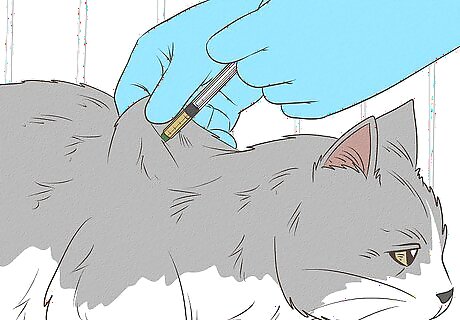
Allow your cat to undergo radioactive iodine therapy. With radioactive iodine therapy, your cat will not need to be anesthetized and will not have any side effects after the procedure. For the procedure, your cat will receive an intravenous injection of radioactive iodine. After the injection, your cat will stay at the veterinary hospital until her radiation levels are within an acceptable range, during which time she will not be able to accept any visitors. The radioactive iodine will travel only to the thyroid gland (and any ectopic thyroid tissue), and will not harm any other organs in your cat’s body. Thyroid hormone levels typically return to normal within one to weeks following the procedure. Radioactive iodine therapy is curative in about 95% of feline hyperthyroid cases. Your veterinarian may recommend a repeat treatment if your cat’s thyroid hormone levels do not return to normal.
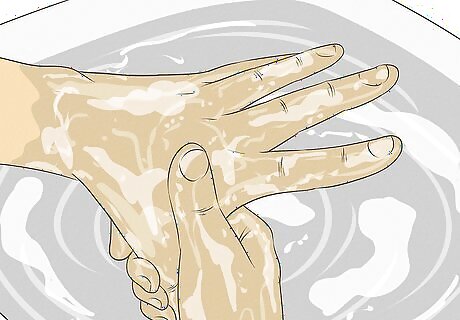
Follow at-home care instructions after radioactive iodine therapy. Although your cat will not have any side effects following radioactive therapy, you will need take a few extra precautions with him in the first two weeks after bringing him home. For example, you should use only flushable litter. Also, limit your handling of him to 10 minutes a day. Wash your hands after you handle him or anything else cat-related (e.g., cat litter, food and water bowls). If your cat is indoor/outdoor, keep him indoors for the first two weeks after the procedure. Do not handle your cat during those first two weeks if you are pregnant. Also, young children should not handle him during that time frame.
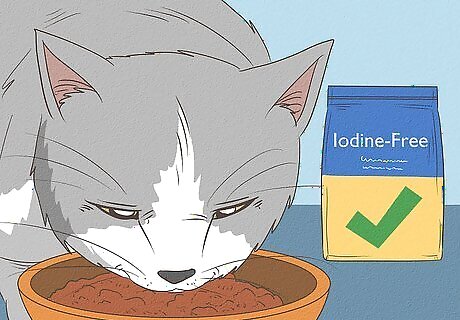
Feed your cat a specialized diet. Instead of these other therapies, your veterinarian may recommend feeding your cat a special cat food that is iodine-free. Since iodine is needed to build thyroid hormones, the lack of iodine in your cat’s food would prevent thyroid hormone production in your cat’s body. This is a good option for indoor cats in single-cat homes. Such a specialized diet will likely not be available at your local pet store, so you will need to purchase it through your veterinarian.




















Comments
0 comment